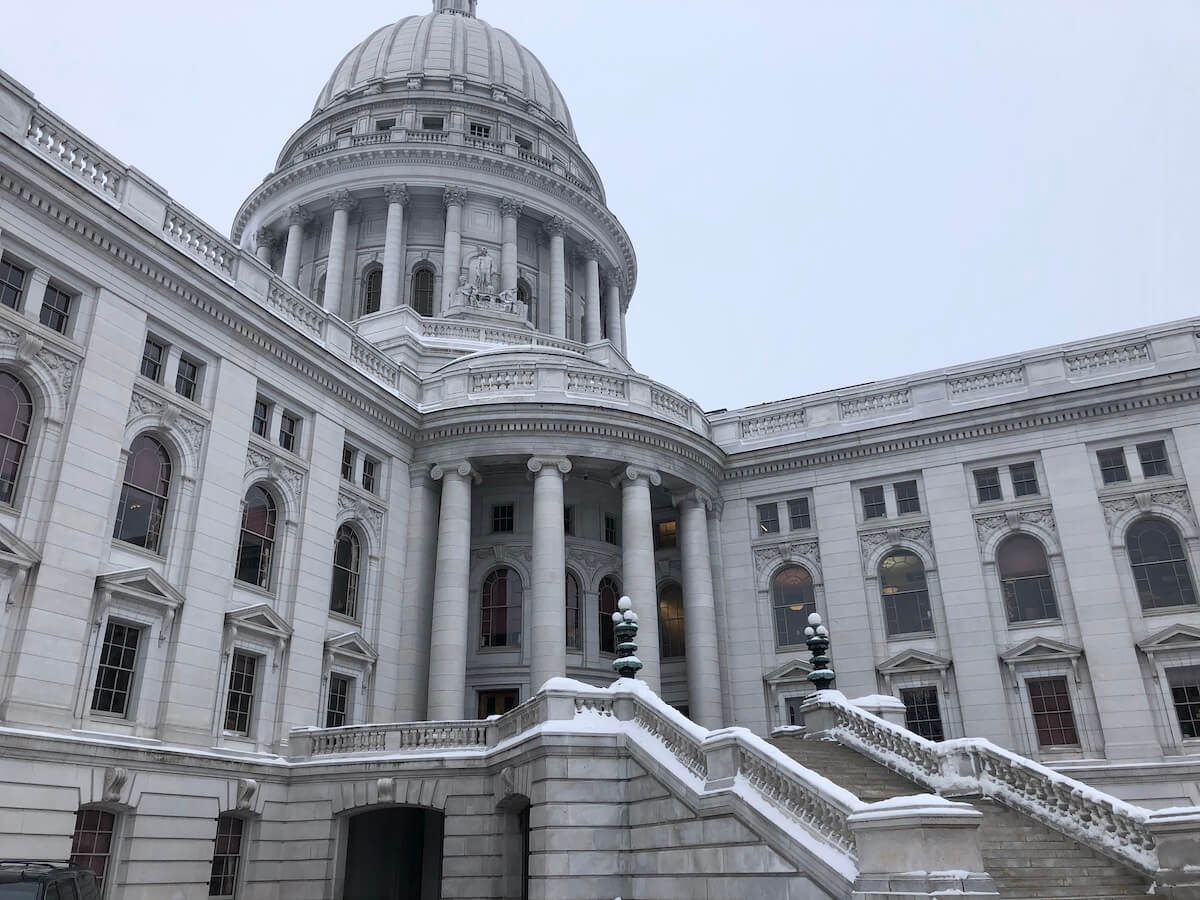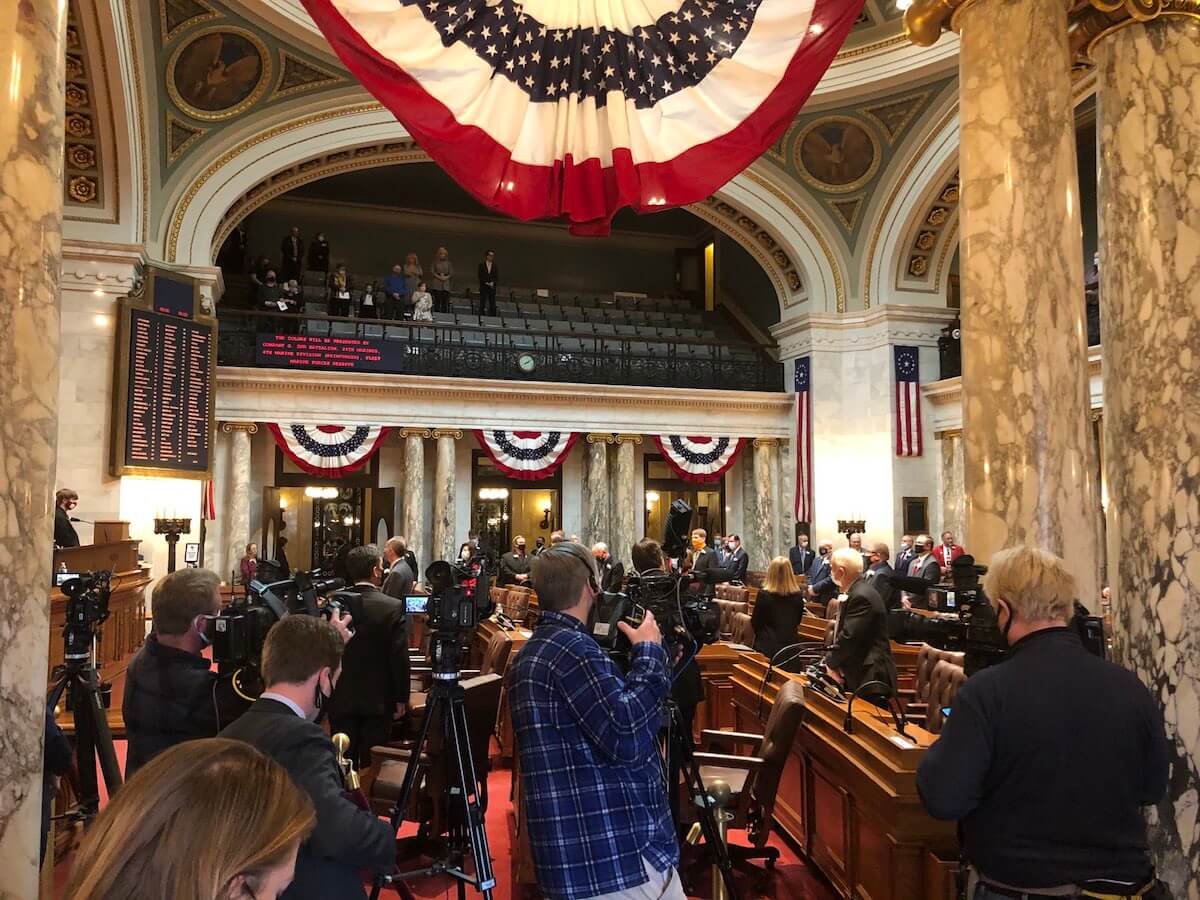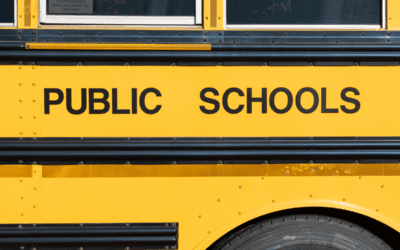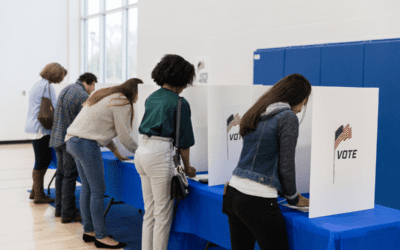
A light dusting of snow is seen on and around the state Capitol in Madison as the Wisconsin Legislature begins its new session on Jan. 4, 2021. (UNN Staff Photo/Jessica VanEgeren)
Governor wants immediate action on a compromise bill while Democratic lawmakers want a proposal that goes even further.
Gov. Tony Evers and Wisconsin Democrats have kicked off the 105th regular session of the Wisconsin Legislature by pushing Republicans for fast action on COVID-19 relief.
Evers on Monday morning sent a letter to the legislators asking that his compromise bill, which includes legislation that both he and Republicans leadership agreed on, be the first bill passed this session.
“Time is of the essence, and frankly, we cannot delay any longer. It is time to move forward on legislation where there is agreement,” Evers wrote. “Wisconsinites expect and are counting on perhaps now more than ever a state government that works effectively and efficiently for them.”
Republican leadership never brought the 104th session of the Legislature back to town in 2020 after adjourning last April.
Legislative Democrats on Monday put forward their own proposed COVID-19 package, which combines the compromise measure and a proposal they call the Healthcare Heroes Act.
Assembly Minority Leader Gordon Hintz (D-Oshkosh) said the bill was focused on “the most critical areas to ensure health and safety,” and called for “immediate action.”
The Healthcare Heroes Act would provide hazard pay, paid sick leave for healthcare workers, state-funded COVID-19 testing and treatment for those who are uninsured, and expanded health insurance coverage to include COVID-19 testing and care. The bill also calls for Wisconsin to accept the Medicaid expansion, a feature of the Affordable Care Act that has been rejected by Republicans despite costing the state more than $1 billion in lost federal funds.
The bill was put forward in the last session by Rep. Robyn Vining (D-Wauwatosa), Rep. Mark Spreitzer (D-Beloit), Rep. Daniel Riemer (D-Milwaukee), and Sen. Jon Erpenbach (D-West Point) in June but did not gain any traction in the Republican-led legislature.
The goal of this new combined package, Hintz said, was to include the items that Evers and the Republican leadership agreed upon with Democrats’ priorities, including support for healthcare workers and expanding Medicaid. By including the Medicaid expansion, which could add an estimated $3 million to the state’s coffers, Hintz said the bill would be revenue neutral.
RELATED: Evers Says Gerrymandering Allowed GOP to Abandon Wisconsin in the Depths of a Pandemic
“We’re not doing any pie-in-the-sky stuff,” Hintz said. “Certainly the governor had more aggressive measures [in his first COVID-19 package], but if you look at the [compromise] package, it was aimed at getting something passed. These are things that I think are really doable that the public really needs.”
It was also a signal from Assembly Democrats that while they would not be participating in the inauguration ceremony on Monday, they hoped to “get to work” on COVID-19 relief.
“The most important thing we can do on day one is to focus on getting our most urgent issues and legislation introduced,” Hintz said. “I can tell you constituents care far more that we’re putting something out there, that we are getting behind things, that we’re calling for bipartisan action than they do whether we’re in an in-person ceremony or not.”

When asked about Assembly Democrats’ decision not to participate in the inauguration ceremony, Hintz took issue with the word “boycott” arguing that his members had been sworn in and they’d chosen to do so because the “wild west attitude” Republicans were pushing looks, “strong [but] wrong.”
“We shouldn’t be in the position that we’re in,” Hintz said. “It’s unfathomable that at a time when hospitals, doctors and frontline workers are begging us to stay home, that we’re getting the opposite response from Republican leaders.”
Senate Democrats do plan to participate in the Senate’s opening ceremonies. Senators were told to hold private swearing-in ceremonies before convening Monday afternoon and they still have the option of participating virtually in hearings unlike in the Assembly where Speaker Robin Vos (R-Rochester) is requiring in-person attendance for committees and floor sessions.
In addition to the Healthcare Heroes Act, the Assembly Democrats’ bill includes $466 million in funding for COVID-19 public health efforts such as:
- Testing ($58 million)
- Contact tracing ($36 million)
- Testing supplies and lab diagnoses ($255 million)
- Hospital surge capacity support and potential alternate facilities ($105 million)
- Vaccine distribution and awareness ($12 million)
It also allocates funding for COVID-19 relief programs funded under the CARES Act, such as rental assistance, food security programs, childcare supplements, and the “We’re All Innovating” business grants. Hospitals would receive payments for outpatient services and nursing facility level of care to help cover some of the costs incurred by the pandemic. School districts would have flexibility with students counts so they could receive more per-pupil aid.

Opinion: Many to thank in fair maps victory for Wisconsinites
On February 19, 2024, Governor Tony Evers signed into law new and fair state legislative maps, bringing hope for an end to over a decade of...

Opinion: Empowering educators: A call for negotiation rights in Wisconsin
This week marks “Public Schools Week,” highlighting the dedication of teachers, paras, custodians, secretaries and others who collaborate with...

Op-ed: Trump’s journey from hosting The Apprentice to being the biggest loser
Leading up to the 2016 election, Donald Trump crafted an image of himself as a successful businessman and a winner. But in reality, Trump has a long...

Not just abortion: IVF ruling next phase in the right’s war on reproductive freedom
Nearly two years after the US Supreme Court overturned Roe v. Wade, another court is using that ruling to go after one of the anti-abortion right’s...




